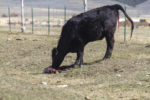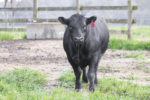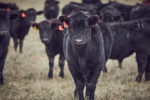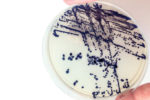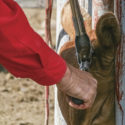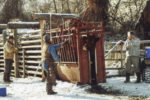Cattle Health
The placenta should shed on its own, but in some instances, nutritional deficiencies or a difficult calving can keep the placenta retained. In this case, producers should monitor the cow for infection and avoid manual and antibiotic treatments.
Read More
Zoonotic disease risks during calving season
The health risks you face when handling livestock may seem minimal, but being familiar with zoonotic diseases protects you specifically with the care of young calves.
Read More
Reducing disease risk on a cow-calf operation
Many cow-calf operations are considered closed herds and only bring new animals onto the property with the addition of new herd sires. However, with any new addition, the greater the risk for disease and the need for biosecurity.
Read More
Should you re-treat that sick calf?
When it comes to treating BRD, consult a veterinarian to determine proper post-treatment intervals and take steps to increase first-treatment success.
Read More
Neonatal calf scours: Considering all management aspects
Scours can be caused by any number of environmental factors and can quickly overwhelm a herd during calving season. Understanding what specific steps you can take on your operation to reduce risk could pay big dividends.
Read More
Good bacteria: The answer to clostridium
How can producers help cattle survive and thrive against opportunistic pathogens? When bacterial pathogens like clostridium are the issue, proper utilization of good bacteria can be a powerful answer.
Read More
Histophilosis-caused issues in feedlot cattle
H. somni can be difficult to detect and treat and can cause a variety of clinical syndromes in feedlot cattle including pneumonia, thrombotic meningoencephalitis (TME), reproductive disease, joint infections and more.
Read More
Unraveling the diverse aspects of pain mitigation
Cattle producers understand procedures such as castration and dehorning cause pain. But while research continues, questions like "How intense is the pain, how can we measure it, and what can be done about it?" still lack concrete answers.
Read More
Time your pre-calving vaccination programs for cows
Proper management and timing is crucial to making pre-calving vaccinations effective in establishing calf immune systems.
Read More
Control Clostridium perfringens type A bacteria levels in calves
Clostridium perfringens type A (CpA), if allowed to overgrow because of excess starch or carbohydrates in the ration, can result in sudden death.
Read More
